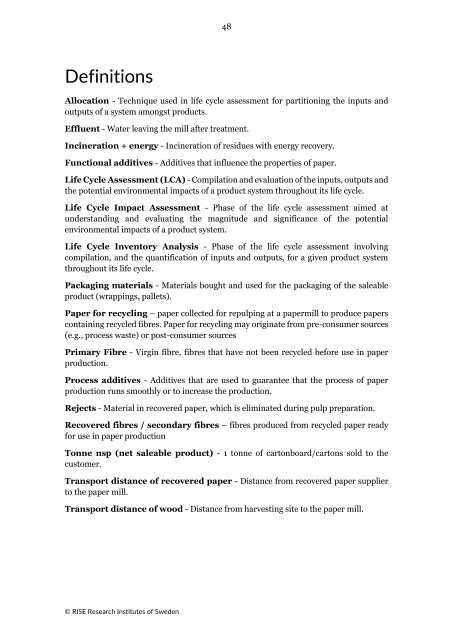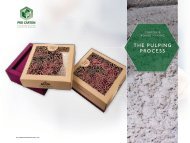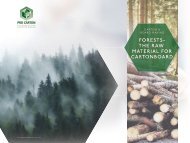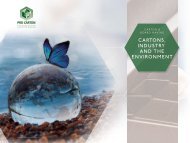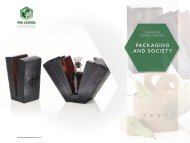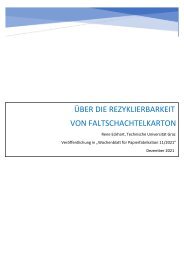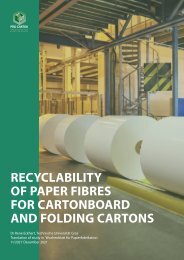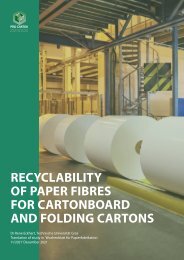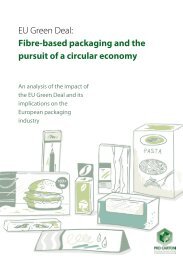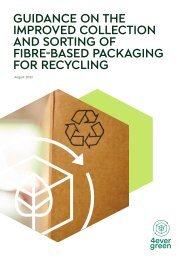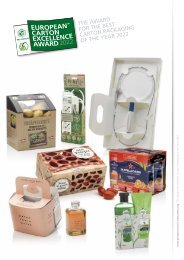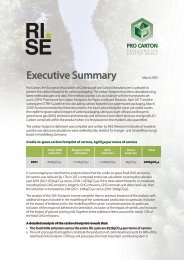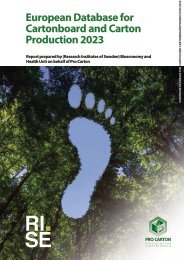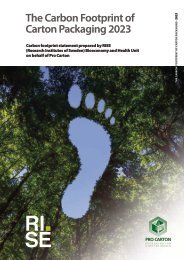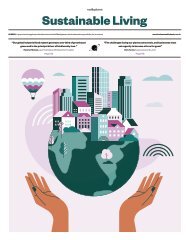European database for cartonboard and carton production, 2023
Create successful ePaper yourself
Turn your PDF publications into a flip-book with our unique Google optimized e-Paper software.
45<br />
the mill per tonne of virgin <strong><strong>carton</strong>board</strong> <strong>and</strong> a 7% reduction in fossil carbon dioxide<br />
emissions arising at the mill per tonne of recycled <strong><strong>carton</strong>board</strong><br />
• Fossil carbon dioxide emissions from fuels consumed at converting operations have been<br />
reduced by 38% in 2021 compared to 2018.<br />
• Total water input per tonne of recycled <strong><strong>carton</strong>board</strong> is reduced by 33% from 14.43 m 3 per<br />
tonne to 9.73 m 3 per tonne.<br />
• There has been an improvement in efficiency of board use at the converting plants. In<br />
2021, 1.169 tonnes of <strong><strong>carton</strong>board</strong> were required to produce 1 tonne of <strong>carton</strong>s, compated<br />
to 1.245 tonnes of <strong><strong>carton</strong>board</strong> per tonne of <strong>carton</strong>s required in 2018.<br />
Sustainable <strong>for</strong>est management<br />
There is currently no life cycle impact assessment methodology <strong>for</strong> biodiversity impacts<br />
of <strong>for</strong>est management to produce primary fibres <strong>for</strong> fibre-based products. Nevertheless,<br />
biodiversity impacts are an essential element of <strong>for</strong>est industry products. Sustainable<br />
<strong>for</strong>est management practices have been developed to protect <strong>and</strong> maintain the ecosystem<br />
services in managed <strong>for</strong>ests <strong>and</strong> plantations. The voluntary sustainable <strong>for</strong>est<br />
management certification schemes have been designed to address relevant practices that<br />
help protect ecosystem services such as biodiversity or those that are impacted by l<strong>and</strong><br />
use <strong>and</strong> their implementation has been verified through an accredited, independent third<br />
party. These practices set a proxy <strong>for</strong> mitigating l<strong>and</strong> use impacts <strong>and</strong> protecting<br />
biodiversity.<br />
The data collection revealed that >80% of the pulp wood used <strong>for</strong> the <strong>production</strong> of<br />
<strong><strong>carton</strong>board</strong> by the companies returning the survey was certified as being sourced from<br />
sustainable managed <strong>for</strong>ests. Predominantly, primary fibres are FSC or PEFC certified.<br />
A similar proportion of the purchased pulp is also certified <strong>and</strong> third party verified as<br />
being sourced from sustainable managed <strong>for</strong>ests.<br />
Details of the specific countries of origin <strong>and</strong> species of wood used are not provided in<br />
this report. The data provided by incomplete <strong>and</strong> when reviewed it was not deemed<br />
representative of the complete situation.<br />
Conclusions<br />
This report presents the gate-to-gate life cycle inventories <strong>for</strong> the <strong>production</strong> of<br />
<strong><strong>carton</strong>board</strong>, manufactured primarily from primary fibres, the <strong>production</strong> of<br />
<strong><strong>carton</strong>board</strong> manufactured primarily from recovered fibres, the conversion of<br />
<strong><strong>carton</strong>board</strong> into blank <strong>carton</strong>s, (including die cutting, creasing, printing <strong>and</strong> where<br />
applicable folding/gluing) <strong>and</strong> an aggregated dataset, which considers the <strong>production</strong> of<br />
<strong><strong>carton</strong>board</strong> <strong>and</strong> the conversion of this <strong><strong>carton</strong>board</strong> into <strong>carton</strong>s.<br />
The datasets represent the weighted average <strong>European</strong> situation <strong>for</strong> each of the processes<br />
according to the market <strong>and</strong> technology situation in 2021. The datasets are based on<br />
primary data collected directly from the mills <strong>and</strong> convertors operating the processes.<br />
Participation in the surveys <strong>for</strong> <strong><strong>carton</strong>board</strong> <strong>production</strong> was high, with a significant<br />
increase in the number of sites participating <strong>and</strong> the proportion of <strong>European</strong> <strong>production</strong><br />
covered. Participation in the survey <strong>for</strong> <strong>carton</strong> converting was also significant, with data<br />
received from twenty-five converting sites. Although this was fewer sites compared to the<br />
© RISE Research Institutes of Sweden


